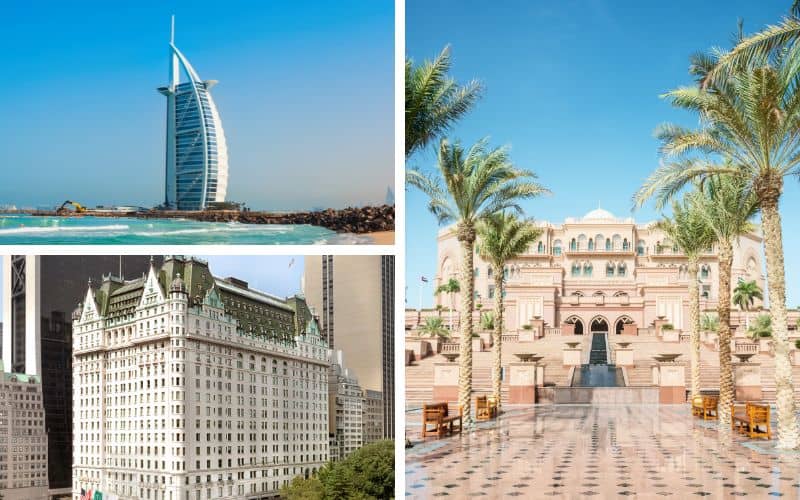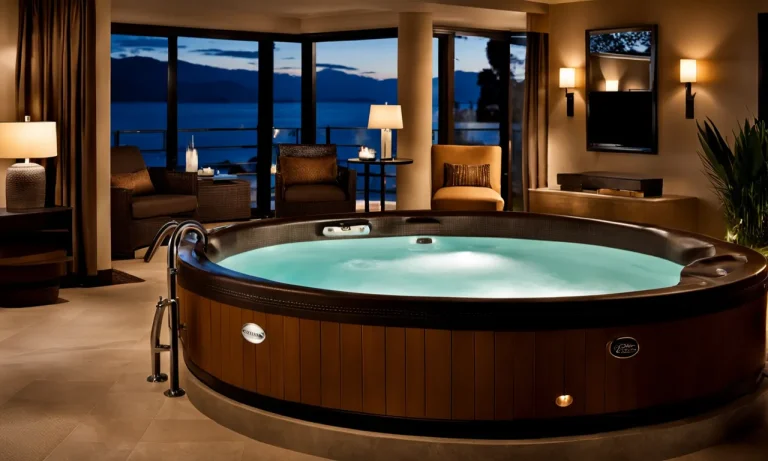When scoping out luxury hotels, you may have wondered just how fancy accommodations can get. Is there such a thing as a 10-star hotel, or is 5 stars the highest rating possible?
While no universal 10-star rating exists today, some elite properties are marketed as beyond 5-star through custom rating systems.
Keep reading if you’re curious about how luxurious the top hotel tiers get. We’ll examine the highest hotel ratings, look at properties dubbed 10-star, and outline what sets the world’s most exceptional hotels apart.
Background on Hotel Rating Systems
When choosing a hotel, the rating system plays a crucial role in determining the quality and comfort of your stay. Hotel rating systems are designed to provide travelers with an objective assessment of a hotel’s facilities, services, and overall experience.
These ratings are typically based on criteria established by industry experts and organizations.
Star Ratings

The star rating system is one of the most commonly used hotel rating systems. This system assigns a certain number of stars to hotels based on their level of luxury, amenities, and services.
The more stars a hotel has, the higher the quality and comfort it is expected to offer.
The star rating system typically ranges from one to five stars, with one star being the lowest and five being the highest. One-star hotels are often budget-friendly with basic accommodations, while five-star hotels are known for their exceptional service, luxurious amenities, and world-class facilities.
It’s important to note that star ratings can vary from one country to another. For example, a three-star hotel in one country may offer different services and amenities than a three-star hotel in another.
Therefore, researching the specific criteria used in the country you plan to visit is always good.
Also Read:
How Are Hotel Stars Determined?
What Are The Requirements For A Five Star Hotel?
Forbes and AAA Ratings
In addition to the star rating system, there are other reputable hotel ratings systems such as Forbes Travel Guide and AAA (American Automobile Association). These organizations have their own rating criteria and provide comprehensive assessments of hotels.
Forbes Travel Guide, known for its prestigious five-star rating, evaluates hotels based on more than 900 objective standards, including service, amenities, and overall experience. Their ratings are highly regarded in the industry and are often considered a symbol of excellence.
AAA, on the other hand, uses a diamond rating system to evaluate hotels. Like the star rating system, AAA’s diamond ratings range from one to five. AAA evaluates hotels based on cleanliness, service, and amenities, ensuring their ratings are reliable and trustworthy.
Custom Hotel Rating Tiers
While star ratings and Forbes/AAA ratings are widely recognized, some hotels may choose to establish their own custom rating tiers. These custom rating systems allow hotels to differentiate themselves and highlight specific features or services that set them apart.
For example, a hotel might create a “platinum” or “diamond plus” rating to signify an even higher level of luxury and exclusivity. Luxury hotels and resorts often use these custom rating tiers to attract discerning travelers seeking a truly exceptional experience.
It’s important to note that while custom rating tiers can provide valuable insights into a hotel’s unique offerings, they may not have the same level of recognition or industry-wide standards as star ratings or Forbes/AAA ratings.
Hotels Marketed as 10-Star

Burj Al Arab in Dubai
Regarding luxury and opulence, the Burj Al Arab in Dubai is often regarded as one of the most prestigious hotels in the world. While there is no official 10-star rating system, the Burj Al Arab is often marketed as a “7-star” hotel, which has led to the misconception of 10-star hotels.
This iconic sail-shaped building stands on its own artificial island and offers unparalleled luxury and amenities to its guests. With stunning views, personalized service, and lavish interiors, the Burj Al Arab symbolizes luxury and extravagance in the hospitality industry.
The Plaza New York
The Plaza, located in the heart of Manhattan, is another hotel often associated with exceptional luxury. While it doesn’t claim to be a 10-star hotel, it has gained a reputation for providing a truly luxurious experience to its guests.
The Plaza has been a landmark in New York City since its opening in 1907 and has hosted countless celebrities, dignitaries, and royalty.
With its lavish decor, impeccable service, and prime location overlooking Central Park, The Plaza is a top choice for discerning travelers seeking a taste of old-world elegance.
Emirates Palace Abu Dhabi
The Emirates Palace in Abu Dhabi is often mentioned in discussions about 10-star hotels. This stunning palace-like hotel is known for its grandeur, opulence, and regal ambiance. While it is not officially rated as a 10-star hotel, it does offer an unrivaled level of luxury and extravagance.
The Emirates Palace boasts over 300 rooms and suites, 13 restaurants, a private beach, and recreational facilities. Its architecture, inspired by Arabian palaces, and top-notch service make it a popular choice for those seeking a truly exceptional hotel experience.
It’s important to note that the concept of a 10-star hotel is more of a marketing strategy rather than an official rating. The hospitality industry typically uses a five-star rating system to evaluate hotels based on their amenities, services, and overall quality.
However, hotels like the Burj Al Arab, The Plaza, and the Emirates Palace have created an aura of exclusivity and luxury that sets them apart from other five-star properties.
Hallmarks of Top Tier Luxury Hotels
When it comes to luxury hotels, certain hallmarks set them apart from the rest. These top-tier establishments go above and beyond to provide an unparalleled experience for their guests. From impeccable service to exclusive experiences, here are some key characteristics of a truly luxurious hotel.
Impeccable Service
One of the defining features of a top-tier luxury hotel is its commitment to delivering exceptional service. When guests enter the lobby, they are greeted with warm smiles and a genuine desire to make their stay as comfortable as possible.
Staff members are highly trained, attentive, and always ready to assist with any request. Whether it’s arranging transportation, making restaurant reservations, or providing personalized recommendations for exploring the city, the level of service at these hotels is simply unmatched.
Luxury Amenities
Another hallmark of top-tier luxury hotels is their extensive range of amenities. These establishments go above and beyond to give their guests a truly indulgent experience. From lavish spas and state-of-the-art fitness centers to rooftop pools and fine dining restaurants, every aspect of the hotel is designed to cater to the needs and desires of its guests.
Luxury brands such as Bvlgari, Hermès, and Chanel often collaborate with these hotels to create bespoke amenities that add an extra touch of opulence.
Attention to Detail
Attention to detail is what truly sets a top-tier luxury hotel apart. Every aspect of the guest experience is carefully curated and meticulously executed. From the design of the rooms to the arrangement of fresh flowers in the lobby, every element is thoughtfully considered to create a sense of beauty and elegance.
The linens are of the highest quality, the furniture is carefully chosen for comfort and aesthetics, and the ambiance exudes luxury. These hotels leave no stone unturned to ensure guests feel pampered and special.
Exclusive Experiences
One of the most exciting aspects of staying in a top-tier luxury hotel is enjoying exclusive experiences. These hotels often offer unique amenities and activities that are not available anywhere else.
Whether it’s a private helicopter tour of the city, a personalized shopping experience with a renowned stylist, or a private cooking class with a Michelin-starred chef, these exclusive experiences are designed to create unforgettable memories for their guests.
These hotels understand the importance of creating moments beyond the ordinary and making their guests feel special.
Also Read: Are Luxury Hotels Profitable?
The Future of Hotel Ratings

As the hospitality industry evolves, so do the standards of hotel ratings. The future of hotel ratings is set to bring exciting changes and innovations that will reshape the way we perceive luxury and excellence in accommodation.
With advancements in technology, changing consumer preferences, and the emergence of new market segments, the future holds immense possibilities for the hotel industry.
New Rating Criteria
One of the key aspects of the future of hotel ratings is the development of new and more comprehensive rating criteria. Traditional rating systems have focused on room size, amenities, and customer service.
However, the future of hotel ratings will likely consider additional factors such as sustainability, technology integration, and experiential offerings.
Hotels that prioritize sustainability by implementing eco-friendly practices will be highly regarded in the future. From energy-efficient systems to waste reduction initiatives, these environmentally conscious hotels will appeal to a growing segment of eco-conscious travelers who value sustainability in their accommodation choices.
Furthermore, integrating technology will play a crucial role in the future of hotel ratings. Hotels that embrace innovative technologies such as smart room controls, virtual reality experiences, and personalized digital concierge services will gain a competitive edge in the industry.
Hyper-Luxury Segment Growth
The future of hotel ratings will witness the growth of the hyper-luxury segment. While five-star hotels have been the pinnacle of luxury for decades, the emergence of hyper-luxury properties will redefine the standards of opulence and exclusivity.
These hotels will go above and beyond to provide unparalleled luxury experiences for their guests.
Hyper-luxury hotels will feature extravagant amenities such as private butler services, exclusive access to VIP events, bespoke dining experiences, and personalized luxury vehicles. These properties will cater to ultra-high-net-worth individuals and discerning travelers seeking luxury and privacy.
Rating Diversification
The future of hotel ratings will also witness a diversification of rating systems. While traditional star ratings have been the industry norm, alternative rating systems based on guest reviews, social media influence, and expert opinions will gain prominence.
This diversification will give travelers a wider range of perspectives and allow a more nuanced understanding of hotel quality.
Online platforms that aggregate guest reviews and ratings, such as TripAdvisor and Booking.com, will continue to play a significant role in shaping the reputation of hotels. Travelers will rely on these platforms to make informed decisions based on previous guests’ experiences.
Conclusion
While no universally recognized 10-star hotel rating exists today, the premier luxury hospitality segment continues to grow. Brands are elevating experiences with hyper-personalized service, one-of-a-kind amenities, and unmatched attention to detail.
We may yet see a true 10-star tier emerge as rating systems evolve. For now, today’s top luxury hotels simply have an aura of magic and mystique beyond any star rating.






